Solar Blanket vs. Module: Which is better for summer camping?

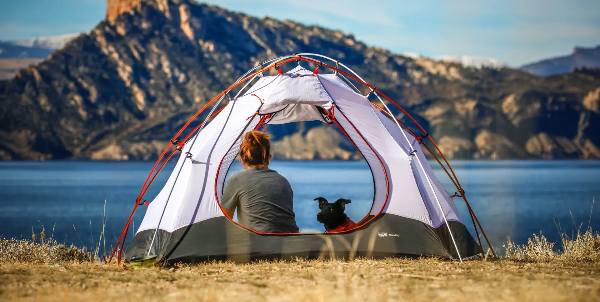
When camping, access to electricity is essential to keep your devices working, and solar energy has become an excellent source of power. However, people often hesitate to opt for a solar panel or solar blanket, especially if they are barely familiar with them.
In this article, we will discuss the difference between solar panel and solar blanket, their advantages and disadvantages, and clarify the question of which of the two you can choose for summer camping.
So let’s get straight into the discussion!
What is the difference between a solar module and a solar blanket
Solar modules are rigid, usually rectangular devices that convert sunlight into electricity.
A solar blanket, on the other hand, is a lighter, more flexible and portable solar panel that can be folded to the size of a laptop and taken anywhere. An example of this is the 100 W 2.2 kg portable BougeRV GIGS-Solar Blanket, which comes with a carrying case. You can carry it around comfortably as if you were carrying a lightweight laptop.
While solar panels are usually mounted on roofs or fixed structures, solar blankets are perfect for camping, boat trips or other outdoor activities. Both effectively use the sun's energy and reduce dependence on traditional energy sources.
Solar Blankets

Solar blankets are very popular with camping enthusiasts who want to make the most of the sun's rays and power their devices. They are made of light and flexible solar cells and can be easily folded up and stored in a backpack. However, as with any product, there are advantages and disadvantages to using a solar blanket when camping.
How much electricity does a solar blanket generate?
The amount of energy a solar blanket can generate depends on several factors, including the size of the solar module, the amount of sunlight and the efficiency of the solar cells.
A Solar Blanket can generate on average between 100 and 500 watts per hour, depending on the factors mentioned above. With this amount of energy, a Solar Blanket can charge small electronic devices such as smartphones and tablets, as well as small appliances such as a mini-fridge or a small fan.
Advantages Solar Blanket
Lighter and more portable. In comparison, solar panels weigh 10-20 pounds per square foot. Solar blankets are lighter than solar panels watt for watt and are much more compact when folded.
You can quickly transport them from one place to another and use them in a variety of situations, from camping trips to emergencies. Lightweight solar blankets are especially suitable for campers, backpackers and hikers who don't want to lug around heavy batteries or generators.
Easy assembly without tools. Before use, you must spread the mats out and hold them directly in the sun. If you have a BougeRV CIGS Solar Blanket with metal mounting holes, you can also simply hang it on your RV.
Cost-effective. Relatively inexpensive compared to other solar-powered devices, Solar Blankets are a cost-effective solution for campers who want to stay connected without breaking the bank.
Extremely versatile. A solar blanket can power a variety of camping devices, including smartphones, tablets, cameras and small appliances such as a fan or mini fridge.
Environmentally friendly. Solar Blankets are environmentally friendly and emission-free, generating renewable energy from the sun. They are a fantastic alternative for anyone looking to reduce their carbon footprint.
Disadvantages of Solar Blanket
-
Weather dependent. Solar blankets require direct sunlight, which means they may not work well on cloudy days or in shady areas, so you'll need to adjust their location to get as much sunlight as possible.
-
Limited power output. Solar Blankets have a limited power output that may not be ideal for charging larger devices like laptops, but they are best suited for small devices.
-
Slow charging. Charging devices with a Solar Blanket can be slow, especially on cloudy days with little sunlight.
-
They can be easily stolen. Solar blankets are lightweight and can be tucked under your arm and carried with you. Solar blankets are usually more expensive than average monocrystalline panels, so if one is stolen you are in for a real shambles.
solar modules
What is a solar module?solar modules also store sunlight and convert it into electricity. They are made of various materials, including silicon, a common material used to make solar panels. The solar panels are placed between two layers of protective material, usually glass or plastic, to create a durable and weather-resistant panel.
Solar panels can power homes, businesses, and even entire communities, and they're growing in popularity as people look for ways to reduce their carbon footprint and save money on energy bills.

Fixed solar modules and portable solar modules
Fixed solar panels are permanent systems that are mounted on roofs or open spaces. They are usually connected to your vehicle so you can power your devices while on the road or at the campsite.
On the other hand, solar panels need to be placed in direct sunlight to achieve the best results, which is not always possible in campsites.
Portable solar panels are a great choice if you're on a budget and don't plan on traveling regularly. They're usually bulkier and heavier than their counterparts, but if you're only going away for a few days and only taking the essentials, portable solar panels shouldn't be a problem. However, for longer trips, they can be a headache!
Advantages of solar modules
-
Easy to maintain. All you have to do is wipe the glass surface.
-
Durability for years. Solar panels can last for about 40 years. And even after that, camping solar panels are known to have an efficiency of up to 85%.
-
Quiet operation of your devices. When in operation, the solar modules will hardly stop you from listening to the flow of the river and the birdsong.
-
Versatile. You can use it to charge your car battery. Or you can use solar cells to create a portable power station, which you can then use to power your camping equipment.
Disadvantages of solar modules
- Bulky and heavier.
- Solar modules require some adjustments.
- For best results, you need to park your camper in full sun.
- This also takes up space for any surfboards on the roof.
- The solar modules must be wired.
- Relatively prone to breakage.
Solar blanket vs. module? Which is better for camping?
We've covered the basics about solar blankets and solar panels, but which is better for camping? The answer ultimately depends on what kind of camper you are and what your specific needs and budget are.

What type of camper are you?
- weekend campers
For weekend campers who only need to charge a few devices, a solar blanket is a better choice. These lightweight and portable mats fit easily into a backpack and set up in just a few minutes. They're also less expensive than solar panels, making them an excellent choice for those on a budget.
- Normal campers who own a 4×4 or a caravan.
Regular campers with a 4x4 or caravan will benefit more from a solar panel. These larger panels can generate more electricity, making them ideal for powering multiple devices or even running appliances. While they are more expensive than solar blankets, they are a worthwhile investment if you go camping frequently.
- full-time travelers and grey nomads
Solar panels are a must-have for full-time travelers and gray nomads. These campers rely on solar energy to run their entire home on wheels, from charging devices to providing electricity to heating water.
In this case, investing in a high-quality solar panel system is essential for a comfortable and sustainable lifestyle on the road.
Depending on your specific needs and budget
Ultimately, the decision between solar blankets and solar panels depends on your specific needs and budget. While solar blankets are more convenient and affordable for some, a solar panel is a better long-term investment for those who frequently camp or live on the road.
Regardless of what you choose, a reliable solar power source will make your camping experience more enjoyable and sustainable.
BougeRV Portable Solar Blankets
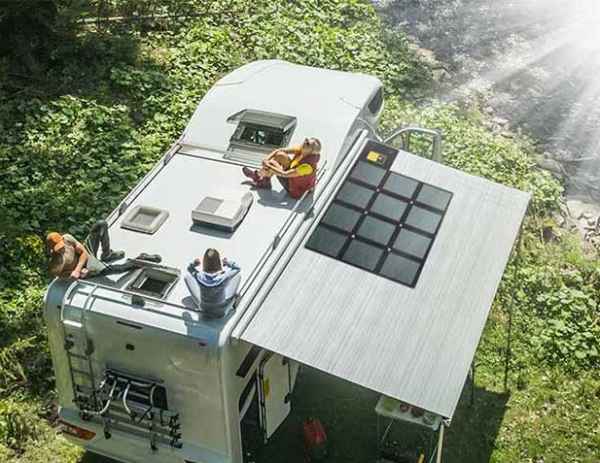
The portable Solar Blankets from BougeRV are the perfect solution if you enjoy exploring the great outdoors while staying connected to the world.
-
The solar modules remain in good condition and function without cracks even after thousands of collisions during the journey. The solar blankets, manufactured using advanced CIGS technology, are highly efficient, durable and flexible.
-
With up to 100 watts of power, BougeRV Solar Blankets can quickly charge your RV battery, power your devices like phones and cameras, and even keep your appliances running for extended periods of time.
-
BougeRV's Solar Blankets are lightweight and compact, making them easy to transport and set up anywhere. They are also weatherproof, so you can use them on a rainy and cloudy day.
-
BougeRV's Solar Blankets are eco-friendly as they collect clean and renewable energy without producing harmful emissions. They are also cost-effective, costing only about $450, reducing your dependence on traditional power sources and saving on energy costs in the long run.
In short, BougeRV's portable Solar Blankets offer a convenient, efficient and sustainable way to power your adventures.
Conclusion
After reading this blog, we are sure that you know the answer to the question of choosing solar cells or solar panels for your campsite. As mentioned earlier, solar blankets and solar panels have advantages and disadvantages.
But you can always choose depending on your needs and the type of camper you are! Want to know more about solar solutions for camping? Discover it now!
FAQs
- Can you leave Solar Blankets out in the rain?
Yes. Rain helps wash dust off the module and improve performance.
- Can a solar blanket power a refrigerator?
No. You cannot charge a 12V refrigerator directly with a solar blanket. Instead, you can store the solar energy in a 12V battery and use it to power the refrigerator.

 Outdoor Ausrüstung
Outdoor Ausrüstung
 Campinglampen
Campinglampen
 CRPRO
CRPRO
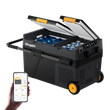 CRD2
CRD2
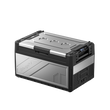 Rocky
Rocky
 CRS
CRS
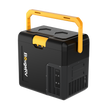 CRH
CRH
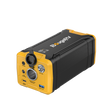 Kühlschrank Zubehör
Kühlschrank Zubehör
 Bifacial Solarpanel
Bifacial Solarpanel
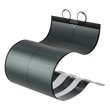 CIGS 360° Flexible Solarpanels
CIGS 360° Flexible Solarpanels
 Fiberglas Solarmodule
Fiberglas Solarmodule
 Solar Laderegler
Solar Laderegler
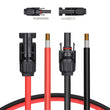 Solar Zubehör
Solar Zubehör
 Outdoor Geräte
Outdoor Geräte
 Generator
Generator









